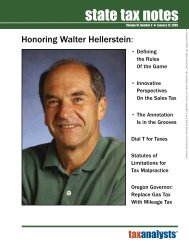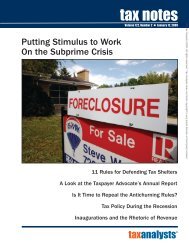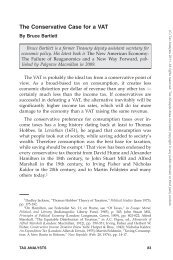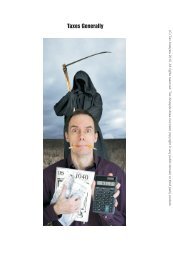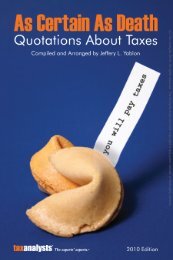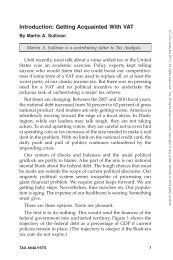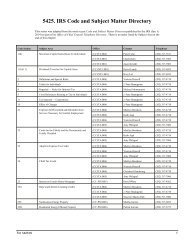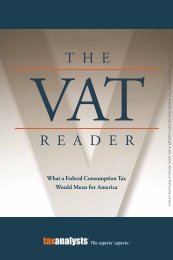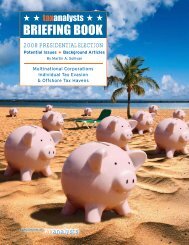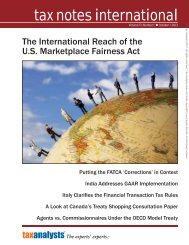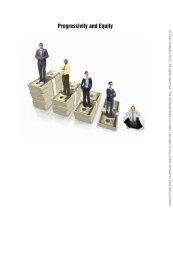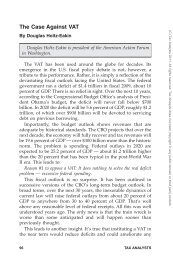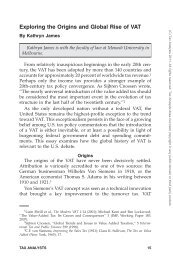Forty Years of Change, One Constant: Tax Analysts
Forty Years of Change, One Constant: Tax Analysts
Forty Years of Change, One Constant: Tax Analysts
Create successful ePaper yourself
Turn your PDF publications into a flip-book with our unique Google optimized e-Paper software.
<strong>Forty</strong> <strong>Years</strong> <strong>of</strong> <strong>Change</strong>, <strong>One</strong> <strong>Constant</strong>: <strong>Tax</strong> <strong>Analysts</strong><br />
Bruce Ely<br />
Bradley Arant Boult Cummings LLP<br />
Birmingham, Ala.<br />
<strong>One</strong> <strong>of</strong> the most notable and refreshing changes<br />
I’ve witnessed during my almost 30 years <strong>of</strong><br />
practice has been the increased number <strong>of</strong> women<br />
tax practitioners as well as tax vice presidents, tax<br />
directors, and other senior in-house tax staff. That<br />
trend is <strong>of</strong> course also reflected in law school and<br />
accounting program enrollment, and I am delighted<br />
to see it. The trend is a bit slower, but nevertheless<br />
clear within the state departments <strong>of</strong> revenue or finance<br />
as well. Heck, statistics show that us old white<br />
guys will be in the distinct minority within 30 years,<br />
so we’d better become more involved in recruiting<br />
and mentoring bright young women for the state and<br />
local tax (SALT) pr<strong>of</strong>ession who will succeed us one<br />
day.<br />
I hope that our efforts to recruit and mentor<br />
bright young African-American SALT talent will<br />
become more successful in the next few years than<br />
I have witnessed so far — but alas, that may be my<br />
perspective as a tax lawyer from the Deep South.<br />
Our law firm is having good success in recruiting<br />
African-American lawyers for other fields <strong>of</strong> law,<br />
but not SALT. What’s up with that? Are they afraid<br />
to butt heads with that scruffy David Brunori, Rev.<br />
Huddleston, or that wild and crazy Bruce Fort?<br />
They’re missing out on all the fun.<br />
Jeff Friedman<br />
Sutherland Asbill & Brennan LLP<br />
Washington<br />
I believe that the heightened sophistication <strong>of</strong><br />
state departments <strong>of</strong> revenue is the most significant<br />
change I have seen in my career. The challenges<br />
faced by states generally, and departments <strong>of</strong><br />
revenue specifically, have been met with creative<br />
and interesting responses. State legislatures have<br />
implemented new types <strong>of</strong> taxes, reduced reliance on<br />
conformity to the Internal Revenue Code, adopted<br />
antiabuse regimes, and mandated streamlined tax<br />
compliance. State departments <strong>of</strong> revenue have met<br />
each <strong>of</strong> those challenges with novel responses.<br />
However, the most obvious examples demonstrating<br />
the increased sophistication <strong>of</strong> state<br />
departments <strong>of</strong> revenue are the growing number<br />
<strong>of</strong> significant court decisions. Constitutional limitations<br />
and statutory construction challenges permeate<br />
the field <strong>of</strong> state and local taxation. State departments<br />
<strong>of</strong> revenue are under pressure to formulate<br />
positions and arguments dealing with these and<br />
other issues that are ultimately tested in court.<br />
Whether successful or not, their novel arguments<br />
have changed the shape <strong>of</strong> our field — which has<br />
benefited all state tax systems.<br />
Many <strong>of</strong> the solutions, whether creative, novel,<br />
or otherwise, have been fashioned by departments<br />
<strong>of</strong> revenue in times <strong>of</strong> financial crisis and dwindling<br />
resources. The ingenuity and depth <strong>of</strong> thinking<br />
advanced by state departments <strong>of</strong> revenue show no<br />
sign <strong>of</strong> slowing down. If their sophistication continues<br />
on the same path that has been followed over the<br />
last couple <strong>of</strong> decades, we can be certain that the field<br />
<strong>of</strong> state taxation will continue to be an interesting,<br />
challenging, and rewarding field <strong>of</strong> law.<br />
Bryan Gates<br />
American Academy <strong>of</strong> <strong>Tax</strong> Practice<br />
Belleair, Fla.<br />
<strong>One</strong> <strong>of</strong> the most significant changes to tax<br />
administration, practice, or policy ever seen in a<br />
pr<strong>of</strong>essional career is as follows:<br />
The right <strong>of</strong> the United States to collect its internal<br />
revenue by summary administrative proceedings<br />
has long been settled. Where adequate opportunity<br />
is afforded for a later judicial determination <strong>of</strong> the<br />
legal rights, summary proceedings to secure<br />
prompt performance <strong>of</strong> pecuniary obligations<br />
to the government have been consistently<br />
sustained. Property rights must yield provisionally<br />
to governmental need. Thus, while protection <strong>of</strong><br />
life and liberty from administrative action alleged<br />
to be illegal may be obtained promptly by the writ<br />
<strong>of</strong> habeas corpus, the statutory prohibition <strong>of</strong> any<br />
“suit for the purpose <strong>of</strong> restraining the assessment<br />
or collection <strong>of</strong> any tax” postpones redress<br />
for the alleged invasion <strong>of</strong> property rights if the<br />
exaction is made under color <strong>of</strong> their <strong>of</strong>fices by<br />
revenue <strong>of</strong>ficers charged with the general authority<br />
to assess and collect the revenue.<br />
These words by Justice Louis Brandeis in Phillips<br />
v. Commissioner (1931) continued an IRS practice<br />
that stunned its victims for 67 more years until 1998.<br />
And then:<br />
No levy may be made on any property or right to<br />
property <strong>of</strong> any person unless the Secretary has<br />
notified such person in writing <strong>of</strong> their right to a<br />
hearing under this section [6330] before such levy<br />
is made.<br />
11



